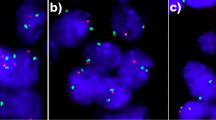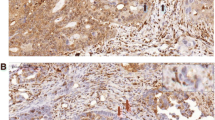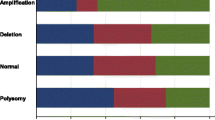Abstract
PTEN is a tumor suppressor that negatively regulates the PI3 K-AKT signaling pathway which is involved in the pathogenesis of many different tumor types and serves as a prognostic marker in breast cancer. However, the significance of the role of PTEN in Middle Eastern ethnic breast cancer has not been explored especially with the fact that breast cancer originating from this ethnic population tend to behave more aggressively than breast cancer in the west. In this study, we analyzed PTEN alteration in a tissue microarray format containing more than 1000 primary breast cancers with clinical follow-up data. Tissue Microarray sections were analyzed for protein expression and copy number change using immunohistochemistry and fluorescence in situ hybridization. Loss of PTEN immunostaining was observed in 77 % of the cases. PTEN loss was significantly associated with large tumor size (p = 0.0030), high grade (p = 0.0281), tumor recurrence (p = 0.0333), and triple-negative breast cancers (p = 0.0086). PTEN loss in triple-negative breast cancers was significantly associated with rapid tumor cell proliferation (p = 0.0396) and poor prognosis (p = 0.0408). PTEN deletion was found only in 60 cases (6.4 %). Loss of PTEN protein expression occurs at high frequency in Middle Eastern breast cancer. PTEN inactivation may potentially lead to an aggressive behavior of tumor cells through stimulation of tumor cell proliferation. Furthermore, PTEN signaling pathway might be used as potential therapeutic target in triple-negative breast cancers since loss of its expression is shown to be significantly associated with this aggressive subtype of breast cancer.



Similar content being viewed by others
Abbreviations
- TNBC:
-
Triple-negative breast cancer
- BLBC:
-
Basal-like breast cancer
- ER:
-
Estrogen receptor
- PR:
-
Progesterone receptor
- HER-2:
-
Human epidermal growth factor receptor 2
- IHC:
-
Immunohistochemistry
- FISH:
-
Fluorescent in situ hybridization
References
Torre LA, Bray F, Siegel RL, Ferlay J, Lortet-Tieulent J, Jemal A (2015) Global cancer statistics, 2012. CA Cancer J Clin 65(2):87–108. doi:10.3322/caac.21262
Bazarbashi S (2010) Cancer Incidence report Saudi Arabia, 35–37
Al Tamimi DM, Shawarby MA, Ahmed A, Hassan AK, AlOdaini AA (2010) Protein expression profile and prevalence pattern of the molecular classes of breast cancer–a Saudi population based study. BMC Cancer 10:223. doi:10.1186/1471-2407-10-223
Al-Kuraya K, Schraml P, Sheikh S, Amr S, Torhorst J, Tapia C, Novotny H, Spichtin H, Maurer R, Mirlacher M, Simon R, Sauter G (2005) Predominance of high-grade pathway in breast cancer development of Middle East women. Mod Pathol 18(7):891–897. doi:10.1038/modpathol.3800408
Stagg J, Allard B (2013) Immunotherapeutic approaches in triple-negative breast cancer: latest research and clinical prospects. Ther Adv Med Oncol 5(3):169–181. doi:10.1177/1758834012475152
Andre F, Zielinski CC (2012) Optimal strategies for the treatment of metastatic triple-negative breast cancer with currently approved agents. Ann Oncol 23 Suppl 6:vi46–vi51. doi:10.1093/annonc/mds195
Di Cosimo S, Baselga J (2010) Management of breast cancer with targeted agents: importance of heterogeneity. [corrected]. Nat Rev Clin Oncol 7(3):139–147. doi:10.1038/nrclinonc.2009.234
Nam BH, Kim SY, Han HS, Kwon Y, Lee KS, Kim TH, Ro J (2008) Breast cancer subtypes and survival in patients with brain metastases. Breast Cancer Res 10(1):R20. doi:10.1186/bcr1870
Hollander MC, Blumenthal GM, Dennis PA (2011) PTEN loss in the continuum of common cancers, rare syndromes and mouse models. Nat Rev Cancer 11(4):289–301. doi:10.1038/nrc3037
Song CH, Park SY, Eom KY, Kim JH, Kim SW, Kim JS, Kim IA (2010) Potential prognostic value of heat-shock protein 90 in the presence of phosphatidylinositol-3-kinase overexpression or loss of PTEN, in invasive breast cancers. Breast Cancer Res 12(2):R20. doi:10.1186/bcr2557
Dean SJ, Perks CM, Holly JM, Bhoo-Pathy N, Looi LM, Mohammed NA, Mun KS, Teo SH, Koobotse MO, Yip CH, Rhodes A (2014) Loss of PTEN expression is associated with IGFBP2 expression, younger age, and late stage in triple-negative breast cancer. Am J Clin Pathol 141(3):323–333. doi:10.1309/AJCPR11DEAYPTUSL
Craig DW, O’Shaughnessy JA, Kiefer JA, Aldrich J, Sinari S, Moses TM, Wong S, Dinh J, Christoforides A, Blum JL, Aitelli CL, Osborne CR, Izatt T, Kurdoglu A, Baker A, Koeman J, Barbacioru C, Sakarya O, De La Vega FM, Siddiqui A, Hoang L, Billings PR, Salhia B, Tolcher AW, Trent JM, Mousses S, Von Hoff D, CarPTEN JD (2013) Genome and transcriptome sequencing in prospective metastatic triple-negative breast cancer uncovers therapeutic vulnerabilities. Mol Cancer Ther 12(1):104–116. doi:10.1158/1535-7163.MCT-12-0781
Capodanno A, Camerini A, Orlandini C, Baldini E, Resta ML, Bevilacqua G, Collecchi P (2009) Dysregulated PI3 K/Akt/PTEN pathway is a marker of a short disease-free survival in node-negative breast carcinoma. Hum Pathol 40(10):1408–1417. doi:10.1016/j.humpath.2009.02.005
Wu Y, Sarkissyan M, Elshimali Y, Vadgama JV (2013) Triple negative breast tumors in African-American and Hispanic/Latina women are high in CD44+, low in CD24+, and have loss of PTEN. PLoS ONE 8(10):e78259. doi:10.1371/journal.pone.0078259
Park YH, Jung HA, Choi MK, Chang W, Choi YL, Do IG, Ahn JS, Im YH (2014) Role of HER3 expression and PTEN loss in patients with HER2-overexpressing metastatic breast cancer (MBC) who received taxane plus trastuzumab treatment. Br J Cancer 110(2):384–391. doi:10.1038/bjc.2013.757
Jones N, Bonnet F, Sfar S, Lafitte M, Lafon D, Sierankowski G, Brouste V, Banneau G, Tunon de Lara C, Debled M, MacGrogan G, Longy M, Sevenet N (2013) Comprehensive analysis of PTEN status in breast carcinomas. Int J Cancer 133(2):323–334. doi:10.1002/ijc.28021
Kononen J, Bubendorf L, Kallioniemi A, Barlund M, Schraml P, Leighton S, Torhorst J, Mihatsch MJ, Sauter G, Kallioniemi OP (1998) Tissue microarrays for high-throughput molecular profiling of tumor specimens. Nat Med 4(7):844–847
Zhang J, Wang Y, Yin Q, Zhang W, Zhang T, Niu Y (2013) An associated classification of triple negative breast cancer: the risk of relapse and the response to chemotherapy. Int J Clin Exp Pathol 6(7):1380–1391
Deyarmin B, Kane JL, Valente AL, van Laar R, Gallagher C, Shriver CD, Ellsworth RE (2013) Effect of ASCO/CAP guidelines for determining ER status on molecular subtype. Ann Surg Oncol 20(1):87–93. doi:10.1245/s10434-012-2588-8
Camp RL, Dolled-Filhart M, Rimm DL (2004) X-tile: a new bio-informatics tool for biomarker assessment and outcome-based cut-point optimization. Clin Cancer Res 10(21):7252–7259. doi:10.1158/1078-0432.CCR-04-0713
Maiques O, Santacana M, Valls J, Pallares J, Mirantes C, Gatius S, Garcia Dios DA, Amant F, Pedersen HC, Dolcet X, Matias-Guiu X (2014) Optimal protocol for PTEN immunostaining; role of analytical and preanalytical variables in PTEN staining in normal and neoplastic endometrial, breast, and prostatic tissues. Hum Pathol 45(3):522–532. doi:10.1016/j.humpath.2013.10.018
Rakha E, Reis-Filho JS (2009) Basal-like breast carcinoma: from expression profiling to routine practice. Arch Pathol Lab Med 133(6):860–868. doi:10.1043/1543-2165-133.6.860
Duman BB, Sahin B, Acikalin A, Ergin M, Zorludemir S (2013) PTEN, Akt, MAPK, p53 and p95 expression to predict trastuzumab resistance in HER2 positive breast cancer. J BUON 18(1):44–50
Yonemori K, Tsuta K, Shimizu C, Hatanaka Y, Hashizume K, Ono M, Kouno T, Ando M, Tamura K, Katsumata N, Hasegawa T, Kinoshita T, Fujiwara Y (2009) Immunohistochemical expression of PTEN and phosphorylated Akt are not correlated with clinical outcome in breast cancer patients treated with trastuzumab-containing neo-adjuvant chemotherapy. Med Oncol 26(3):344–349. doi:10.1007/s12032-008-9127-2
Iqbal J, Thike AA, Cheok PY, Tse GM, Tan PH (2012) Insulin growth factor receptor-1 expression and loss of PTEN protein predict early recurrence in triple-negative breast cancer. Histopathology 61(4):652–659. doi:10.1111/j.1365-2559.2012.04255.x
Perez-Tenorio G, Alkhori L, Olsson B, Waltersson MA, Nordenskjold B, Rutqvist LE, Skoog L, Stal O (2007) PIK3CA mutations and PTEN loss correlate with similar prognostic factors and are not mutually exclusive in breast cancer. Clin Cancer Res 13(12):3577–3584. doi:10.1158/1078-0432.CCR-06-1609
Razis E, Bobos M, Kotoula V, Eleftheraki AG, Kalofonos HP, Pavlakis K, Papakostas P, Aravantinos G, Rigakos G, Efstratiou I, Petraki K, Bafaloukos D, Kostopoulos I, Pectasides D, Kalogeras KT, Skarlos D, Fountzilas G (2011) Evaluation of the association of PIK3CA mutations and PTEN loss with efficacy of trastuzumab therapy in metastatic breast cancer. Breast Cancer Res Treat 128(2):447–456. doi:10.1007/s10549-011-1572-5
Perez EA, Dueck AC, McCullough AE, Chen B, Geiger XJ, Jenkins RB, Lingle WL, Davidson NE, Martino S, Kaufman PA, Kutteh LA, Sledge GW, Harris LN, Gralow JR, Reinholz MM (2013) Impact of PTEN protein expression on benefit from adjuvant trastuzumab in early-stage human epidermal growth factor receptor 2-positive breast cancer in the North Central Cancer Treatment Group N9831 trial. J Clin Oncol 31(17):2115–2122. doi:10.1200/JCO.2012.42.2642
Panigrahi AR, Pinder SE, Chan SY, Paish EC, Robertson JF, Ellis IO (2004) The role of PTEN and its signalling pathways, including AKT, in breast cancer; an assessment of relationships with other prognostic factors and with outcome. J Pathol 204(1):93–100. doi:10.1002/path.1611
Bose S, Chandran S, Mirocha JM, Bose N (2006) The Akt pathway in human breast cancer: a tissue-array-based analysis. Mod Pathol 19(2):238–245. doi:10.1038/modpathol.3800525
Esteva FJ, Guo H, Zhang S, Santa-Maria C, Stone S, Lanchbury JS, Sahin AA, Hortobagyi GN, Yu D (2010) PTEN, PIK3CA, p-AKT, and p-p70S6 K status: association with trastuzumab response and survival in patients with HER2-positive metastatic breast cancer. Am J Pathol 177(4):1647–1656. doi:10.2353/ajpath.2010.090885
Marty B, Maire V, Gravier E, Rigaill G, Vincent-Salomon A, Kappler M, Lebigot I, Djelti F, Tourdes A, Gestraud P, Hupe P, Barillot E, Cruzalegui F, Tucker GC, Stern MH, Thiery JP, Hickman JA, Dubois T (2008) Frequent PTEN genomic alterations and activated phosphatidylinositol 3-kinase pathway in basal-like breast cancer cells. Breast Cancer Res 10(6):R101. doi:10.1186/bcr2204
DeGraffenried LA, Fulcher L, Friedrichs WE, Grunwald V, Ray RB, Hidalgo M (2004) Reduced PTEN expression in breast cancer cells confers susceptibility to inhibitors of the PI3 kinase/Akt pathway. Ann Oncol 15(10):1510–1516. doi:10.1093/annonc/mdh388
Neto JC, Ikoma MM, Carvalho KC, Vassallo J, De Brot M, Gobbi H, Soares FA, Rocha RM (2012) MGMT and PTEN as potential prognostic markers in breast cancer. Exp Mol Pathol 92(1):20–26. doi:10.1016/j.yexmp.2011.09.019
Acknowledgments
We thank Valorie Balde, Padmanaban Annaiyappanaidu, and Zeeshan Qadri for technical assistance.
Conflict of interests
All authors declare that they have no conflict interests in this manuscript.
Author information
Authors and Affiliations
Corresponding author
Additional information
Shaham Beg and Abdul K Siraj have contributed equally to this work.
Electronic supplementary material
Below is the link to the electronic supplementary material.
Rights and permissions
About this article
Cite this article
Beg, S., Siraj, A.K., Prabhakaran, S. et al. Loss of PTEN expression is associated with aggressive behavior and poor prognosis in Middle Eastern triple-negative breast cancer. Breast Cancer Res Treat 151, 541–553 (2015). https://doi.org/10.1007/s10549-015-3430-3
Received:
Accepted:
Published:
Issue Date:
DOI: https://doi.org/10.1007/s10549-015-3430-3




